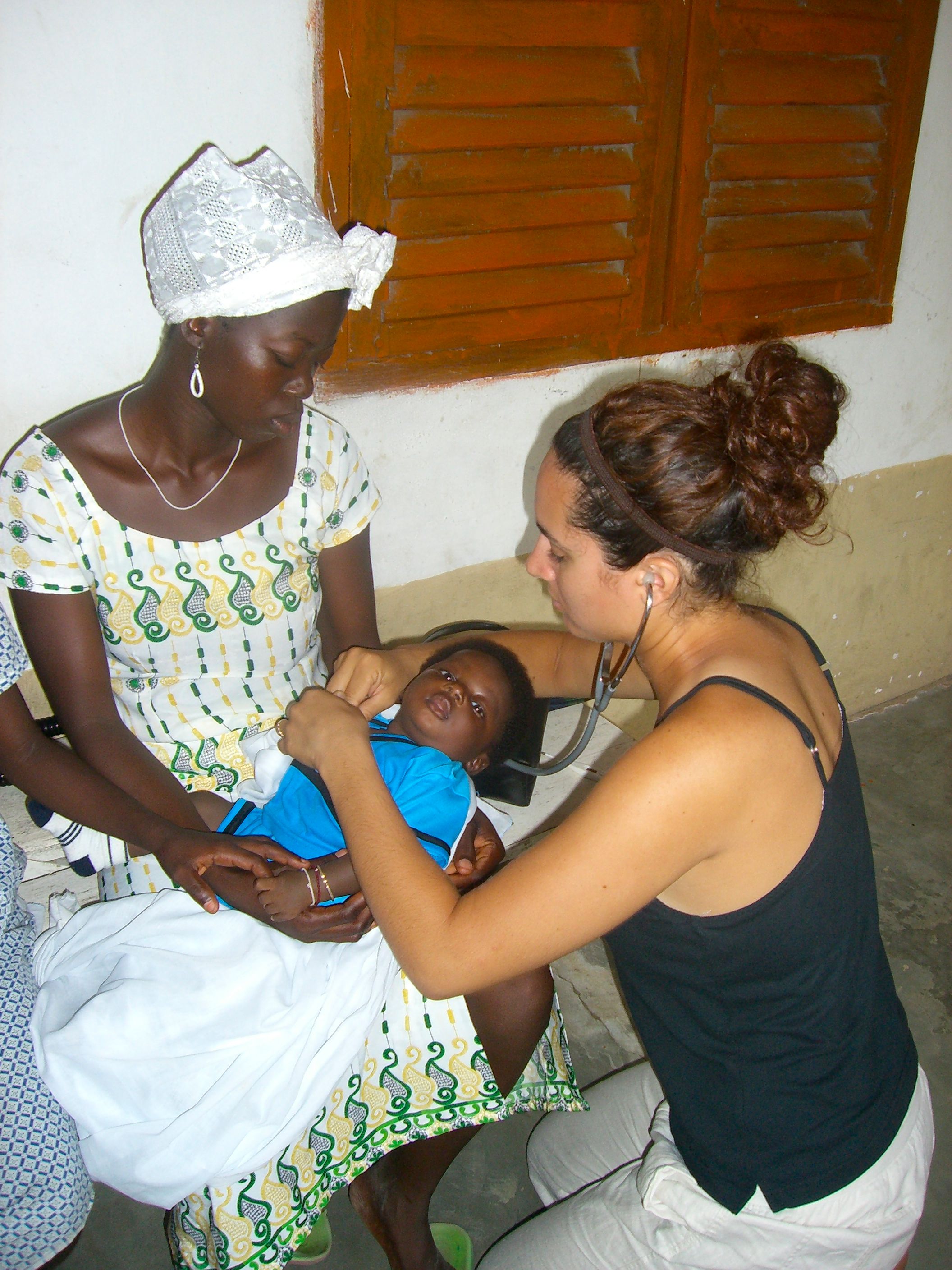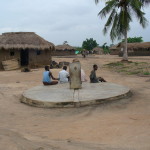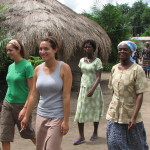We traveled through the countryside on one of our outings for me to see the villages and assess for high blood pressure. We bumped along on the dusty dirt roads that are reshaped each year by the rains and only passable during the dry season. Deep ruts paralleled each side where the unfettered rain had scrubbed away the semblance of a linear path. At our next stop I had to go to the bathroom. A woman led me to the back of the village, to a large open expanse of space, where I found wood planks crossing atop a dug out pit. Huge green leaves the size of printer paper were scattered across the surface in an attempt to camouflage what was below. A giant shit hole. And so I did what anyone would do- I prayed to whomever was listening that I would not fall in.
We often came upon scenes that my guide and friend, Emperor, would wonder if I had encountered before. “Olivia, do you have roads that are this bad in the US?” “Do women cook over the open stove like this?” “Does your power go out most afternoons like this?” “Do you have bathrooms like this?” I realized I actually did not know the answers to these questions. At home I live in a major city, comfortably tucked away in my middle class life. I can hardly say I’d seen or experienced rural America and the poverty I know exists there.
I believed, when I signed up to volunteer in Ghana, that I would be helping people. That I had gained a skill during nursing school that would empower me to offer healing to the world. After spending so much time in the classroom, with my nose in the books, theorizing about how to create a more just and equitable world, there I was. Yet the skills of a nursing education, primarily in the hospital setting of a developed country, had woefully underprepared me for what I encountered.
The clinic was solar powered. Solar power is a catchy buzz word in the States. In rural Ghana, in a small village, it means that sometimes the lights work, but often not, especially not in the middle of the night. Deep into the blue-black night is a popular time to visit the clinic, when the complaints of the day have declared themselves as something that can no longer be ignored, and the required fee for service is seemingly more negotiable.
People were always arriving with what I found to be vague complaints of GI upset. I quickly discovered that I did not know the difference between dysentery and giardia. I had no idea what meds best treat malaria. I did not know how to cross the cultural linguistic chasm. After asking a long list of questions and feeling I was getting nowhere I tried a different tactic. “Are you having diarrhea?” I would request the interpreter to ask in Ewe. The patient would nod yes. “Are you having constipation?” The same patient again nodded yes. I sat there exasperated, unsure whether the error lay with the interpreter, the patient, or myself.
I had never engaged in a conversation with a family that has no money about the importance of taking a child to the hospital. “She might die if you don’t take her,” I implored after evaluating a young girl who barely responded as I assessed her. The young mother looked at me out of the corner of her eyes then quickly glanced away. I did not know if her eyes were glistening due to the sun or suppressed tears. I turned to Enyonam, the clinic nurse I worked with. “Does she not understand?” I questioned. “She knows, she just does not want to spend the money on the child,” she told me.
I sat adjacent to this mother, the heat radiating off her as her child sprawled across her lap. The child did not fuss, did not cry, she just lay there with folds of her mothers bright teal and magenta cloth draped across her. I sat in my seat of privilege and did not know what to say. I didn’t know if her child would live if she took her to the hospital. I didn’t know what children at home would not eat if she spent the money on medical care for this one child. I did not know the equation for life and how to measure worth on a scale of inequality.
Enyonam and I stepped away from the clinic for a moment. Her eyes pierced mine as she spoke, her words quick and decisive. “If you give her money then everyone will expect money, and the clinic will not survive to help others.” As usual my eyes filled with tears despite my attempts to be a powerful and strong woman who does not cry. I stood next to her, warm heat radiated off her body. I could feel the still, wet air between us, and the weight of the small yet significant decision burning into my conscience.
The truth is, while I came here believing I would help, the people I worked with at the clinic were much better prepared to handle the ailments that walked through the doors. What everyone is suffering from are unpaved roads that become inaccessible in the rainy season, and poor reimbursement from the government at clinics that do provide good care, which makes it difficult for these clinics to keep their doors open and shelves stocked. Certainly more well trained health providers would help, but even the most renowned surgeon cannot operate when the lights are out.
Enyonam and I walked back in to the clinic, and she handed the woman the equivalent of five U.S. dollars that we had agreed upon. I raised my eyes to the woman. She nodded in thanks, swaddled her child in her bright cloth, and walked away along the dry, red dirt road to the hospital, the afternoon sun scorching her feet. My heart was heavy, as it was most days as I retreated to my room alone. I never saw that woman or her daughter again. I rarely had the privilege to know the end of the story. While my time moved slowly throughout the days, in the story of life, I was there for only a moment.




